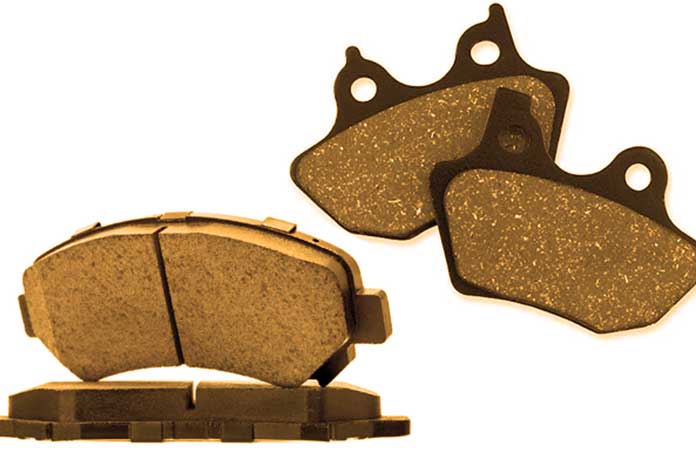Many things might affect how long your brake pads last. Everything from your own driving style to the weather to the wear and tear on your vehicle might have a role. There is a general set of recommendations for producers in the region of 30,000 to 70,000 miles. Pads may last anywhere from a remarkable 100,000 miles down to a meagre 100 miles, depending on factors such as pad quality, rotor wear, friction, and heat generated by everyday driving.
Identify the different kinds of brake pads.
Knowing which of the four primary kinds of brake pad your car uses is essential for locating appropriate replacements. If you are unsure about what you are seeing, it is important to seek the advice of an expert.
Brake pads made of semi-metallic material
Brake pads made of semi-metal, which include between 35 and 65% metal, last a long time and transmit heat efficiently. However, they may be very loud, damage the rotors, and perform poorly in the winter.
Whether it’s organic or NAO (non-asbestos organic), it’s not made with asbestos
These pads are more silent than their semi-metallic counterparts since they are made from fibrous materials like rubber, carbon, or glass. However, their suppler nature also makes them more prone to premature wear and dust accumulation.
NAO which is low-metallic
To improve heat transmission and stopping times, they are often crafted from an organic composition with a trace amount of metal, such steel or copper. These pads do their job well, but the more metal that goes into the mix, the more noise and dust that will be produced.
Ceramic
These brake pads, made mostly of ceramic fibers, are among the most effective on the market. They seldom make a lot of noise, are easy on the rotors, and don’t leave much of a mess. There is, of course, the fact that they are necessarily more costly.
It’s feasible that you can have better brake pads replaced sometimes. However, you should absolutely go to a professional to make sure your automobile is in good shape.
Could you tell me what size of brake pads I need?
Having familiarity with the various brake pad options available is a positive start. The next step is to determine which pad is best for your car. Using the incorrect pad might result in serious damage. One of the most important considerations when selecting brake pad properties is the kind of vehicle being driven.
Vehicles with a low curb weight
One doesn’t need to apply as much pressure to stop a little car. The necessary stopping force may be attained with little noise and cost by using organic brake pads. The sole drawback is the possibility of brake dust accumulation leading to the eventual need for ceramic pad replacement.
Cars of a moderate size
A larger vehicle needs a more powerful brake system. While it may result in louder operation, a NAO with less metallic content is advised. Although more pricey, ceramic pads might also work well.
Should I replace my brake pads?
Despite the fact that you should utilize the aforementioned recommendations for each vehicle type as a starting point, there are some more factors to think about. It’s common to have to make some sacrifices when selecting a brake pad. It’s possible that the quietest and least dusty pad doesn’t even give the finest braking performance. Pads made of softer material may lessen noise, but they will need to be replaced more often as the rotors wear. No one brake pad can provide enough stopping power for every vehicle.
Brake pad manufacturers often provide many pad types for each given car model rather than divulge their proprietary formulations. Though it may seem like a straightforward decision between “good,” “better,” and “best,” don’t be deceived. Even the most costly brake pads on the market won’t protect you and your passengers if they don’t perform adequately for your driving habits. First, think about the routes your automobile travels and the loads it typically carries, and if possible, consult an expert.
Also Read: How Long Does An Electric Car Battery Last?
